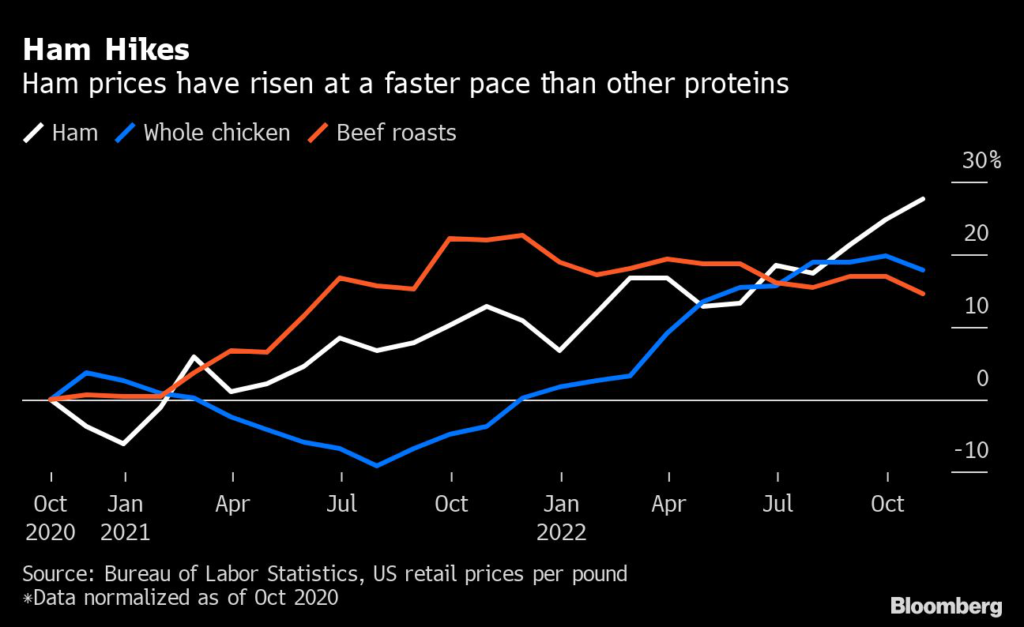Consumers hit by rising prices for both holiday protein staples.
(Bloomberg) — If you’re looking to avoid inflation’s pinch, forget ham and turkey this Christmas. Instead, reach for the ribs.
Turkey has been hit by the worst bird flu outbreak ever, limiting supply and sending prices soaring during the year-end holidays. This has also helped to drive up the price of ham, the other traditional holiday protein, as shoppers look for alternatives. Meanwhile, cuts of pork that don’t require as much processing, such as ribs, have seen plentiful supply and falling prices. Chicken prices, while higher in recent years, have also started to cool off.
Businesses such as Baldor Specialty Foods are preparing for sticker shock. The supplier for restaurants and grocery stores is for the first time promoting whole chickens to customers for holiday meals, in part because it says ham prices have jumped 15% from a year earlier. It’s also advertising a 10-bone pork rack as a less-expensive option.
“We’ve tried to get creative in terms of what we can offer that’s a lower price per pound,” said Kevin Lindgren, Baldor’s director of merchandising. “The processing and the product has just gotten significantly more expensive,” he added, noting that spiral hams require additional labor to smoke, cure and slice. “Especially since August, we’ve seen it pick up pretty significantly.”
Ham prices rose in November for a fourth consecutive month, jumping 7.8% from a year earlier, according to data released Tuesday from the US Labor Department. Prices for the poultry category that includes turkey surged nearly 18%. The most recent increases come on top of higher protein costs across the board during the pandemic, as high feed costs and labor shortages throughout the supply chain drive up prices. And while core inflation is slowing, food inflation seems to be sticking around.
US Foods Holding Corp., a restaurant supplier, said limited capacity and economic challenges have caused higher ham prices. In an email, the Rosemont, Illinois-based company said it’s providing “cost-appropriate alternatives” for its customers and is working “very closely with our suppliers and operators to mitigate cost increases and ensure supply.”
At Famous Dave’s, a barbecue chain with about 120 locations across the US, ham costs are up about 25% from last year. The company offers holiday meals such as whole hickory-smoked turkeys and double-smoked hams, costing $89 on their own or $159 as a package that includes mashed potatoes, mac and cheese, and corn-bread muffins. The company says prices are about 20% higher than last year.
Consumers “are feeling the impact” of inflation when shopping, said Al Hank, co-chief operating officer of BBQ Holdings, the chain’s parent company. He predicted some will trade down on meals for the winter holidays. “Maybe they don’t decide to get the full package,” he said. “They’re going to supplement, and make their own mashed potatoes.”
For its entrees, Famous Dave’s is introducing less-meat-heavy items such as grilled-cheese sandwiches at some locations. The goal is to help make up for lost margins from higher protein costs, while keeping menu prices reasonable for diners.
Low supply is also contributing to higher prices. Ham inventories in US cold storage facilities were in October at their lowest level for that month since 2006. And pork production is also down 3.2% in the year through Dec. 10, according to the US Department of Agriculture.
“We have just overall lower pork production,” said Holly Cook, an economist at the National Pork Producers Council. “Labor is part of it, and we have fewer hogs in the US right now than we’ve had.”
At the same time, the US has sent 9% more ham to Mexico. That’s an estimated fifth of the total US ham supply going across the border, said Bob Brown, an independent livestock and meat market consultant in Edmond, Oklahoma.
“Spiral ham costs are spiraling upwards,” said Tony Sarsam, CEO of SpartanNash Co., a grocery retailer and distributor . “We’re seeing pretty significant inflation there.”
Turkey supply is also low — many have been taken out of cold storage as the bird flu kills millions of birds. Several of the most recent outbreaks have been in turkey farms in South Dakota and Iowa, further limiting availability.
To be sure, retailers are still offering some discounts on center-of-plate proteins such as ham and turkey in efforts to lure shoppers, according to Chris DuBois, protein practice leader at IRI. That means consumers should be able to find some relative bargains, especially if they’re shopping this upcoming weekend “The price declines won’t be as generous all the way through the period,” DuBois said by phone.
Margaret Akbar, 73, said she’s watching closely for sales on a ham that she’s planning to purchase for Christmas this year from nearby grocer Mariano’s. “I have to kind of watch my money,” said the retired nurse who lives in Chicago.
In addition to pricier hams, Akbar says that the sausage links and sliced deli ham, which she regularly picks up for her grandson, have gotten more expensive. That’s forced her to cut those purchases by about half, she said. “Prices have gone up a lot.”
Melissa Cookston, a chef who sells her Memphis-style barbecue ribs and pulled pork on the Goldbelly food website, has upped the price for her holiday hams this year. They’re going for about $150 for a double-smoked spiral ham (which includes shipping), a 50% jump from 2021.
“Traditional holiday proteins are pricier across the board, and impacted by a range of supply-chain issues and inflation pressures,” she said in an email, noting that her hams are “no exception.”
(Adds quote from CEO of SpartanNash Co.)
More stories like this are available on bloomberg.com
©2022 Bloomberg L.P.










